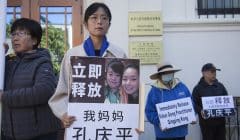Canadians Harassed Online and In-Person Prior to 20th Party Congress

Falun Gong practitioners hold a candlelight vigil in front of the Chinese Consulate in Toronto on July 13, 2019, holding photos of fellow adherents who had died as a result of persecution in China.
Beijing is reportedly ramping up harassment and persecution campaigns against dissidents at home and abroad ahead of the communist regime’s national meeting, with members of a Chinese spiritual practice and other dissidents in Canada saying they are experiencing increased assault, harassment, and intimidation.
Toronto-area resident Jeff Lee, a spokesperson for Falun Gong, a persecuted group in China, said there has been a surge in the number of incidents targeting adherents across Ontario, and that in some cases aggressors have travelled over 100 kilometres to harass adherents.
Lee said that from the evidence he has collected, he has “very good reason” to believe that the Chinese Communist Party (CCP) is behind the harassment and believes that the surge in the number of cases is due to the upcoming National Congress, a major national meeting of top-ranking Party members.
In a Sept. 27 press conference, the Chinese Ministry of Public Security, which oversees the country’s police force, touted the success of its so-called “100-Day Operation,” which has led to the arrest of more than 1.43 million people since June 25. The ministry said it resolved 640,000 criminal cases through the operation.
The Chinese-language edition of The Epoch Times learned that police also targeted many non-criminals in the sweep, including Chinese civilians, dissidents, activists, petitioners, and Falun Gong adherents.
Between July and August this year, at least 1,043 adherents of the traditional spiritual practice were arbitrarily arrested in China, according to Minghui.org, a website that documents the CCP’s persecution of Falun Gong. A total of 614 homes were illegally searched and 62 people were forcefully sent to brainwashing centres, Minghui reported.
As for the harassment incidents in Toronto, Lee said he has referred them to the RCMP and is also considering filing an application with the Human Rights Tribunal of Ontario.
Harassment, Threats
Lee said one recent case of harassment against Falun Gong adherents in Toronto particularly stands out.
On April 4, a man wearing a mask and a baseball cap ripped a banner belonging to an adherent who was doing the Falun Gong exercises at Nathan Phillips Square in downtown Toronto.
“The guy walked up to the Falun Dafa banner and ripped it for no reason. He then threw the banner at me and left,” said the practitioner, known by her surname Qiao.
On Sept. 30, the same man assaulted another Falun Gong adherent in the same area, Lee said. He said the man clawed at the adherent, who tried to record the assault, but the man grabbed his smartphone. The victim managed to wrestle his phone back from the man, who then fled.
Lee said there has also been a rise in intimidation incidents against Falun Gong practitioners, including instances where a Chinese male or female would suddenly approach them and take photos of them at close range, while sometimes also making threats.
According to “Silent Invasion,” a 2018 book by Clive Hamilton on the CCP’s influence operations overseas, Falun Gong is “high on the list of the regime’s targets in Canada,” a situation Hamilton says has worsened with the communist regime’s growing reach into Western societies in recent years.
Dissidents Targeted
Sheng Xue, a key figure in the overseas Chinese pro-democracy movement in Canada, said she has been experiencing a surge in cyberattacks and vilification on social media in recent weeks.
Starting around Sept. 27, Sheng said she had difficulty accessing the internet through her phone and iPad, while her family members had no trouble with their devices. She contacted her telecommunications company, which she said tried various things to fix the problem including changing the modem in her home, but the issue persisted.
On Oct. 1, when Sheng was about to attend a virtual panel discussion on the CCP with an Indian think tank, her internet was cut off abruptly.
What’s more troubling, Sheng said, is the rise in attacks against her on social media by what she identified as the CCP’s “50-cent Army.” The 50-cent Army is made up of people hired by the CCP who use social media accounts and publish internet content with the aim of shaping public opinion. The individuals often write posts that praise the Party’s policies or admonish those who disagree, and are reportedly paid 50 cents per post.
After Sheng posted a video on her Twitter account on Sept. 29 in which she spoke about the CCP’s state terrorism and repression, a large number of what appeared to be 50-cent Army members left comments using profanity and slurs, including calling her a “traitor of China.” Some posted a series of photos of her that were altered in order to make it appear she was engaging in sexual activities.
Similar comments were left on her other videos and posts made in the following days.
Sheng told The Epoch Times she believe that “it’s likely because the 20th National Congress is approaching,” and that the CCP is providing funds for such attacks aimed at repressing overseas dissents.
She said she has been targeted with such attacks before, but rarely by so many internet trolls at once, and that it’s “unlikely” so many attacks could be uncoordinated. “The scale seen this time is unprecedented,” she said.
Based on original reports from Minghui and the Epoch Times.








